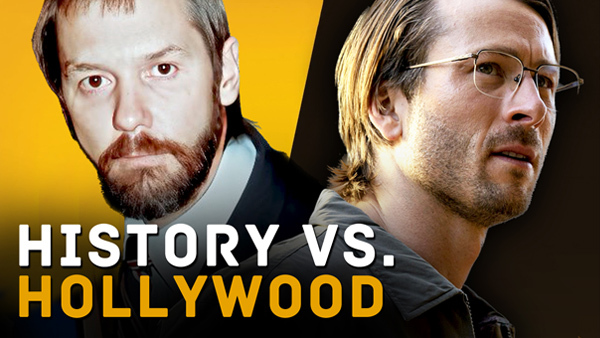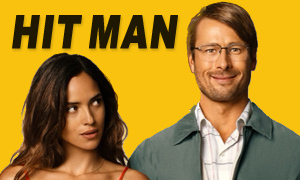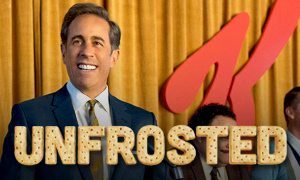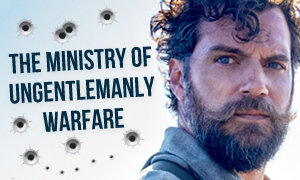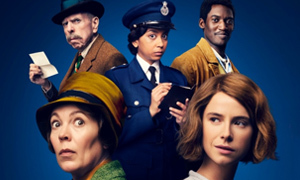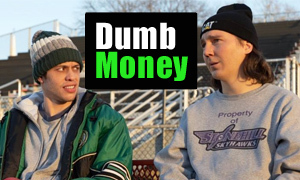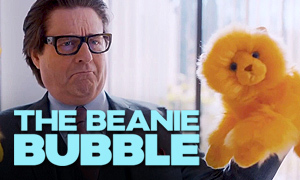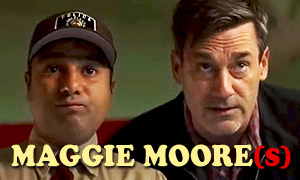How Accurate is Jerry Seinfeld's "Unfrosted" Pop-Tarts movie?
Is Unfrosted based on a true story?
While there is an origin story behind Pop-Tarts, Unfrosted's version is fictional with little resemblance to reality. It is largely the brainchild of Jerry Seinfeld, who co-wrote and directed the movie. Seinfeld had toyed with the idea of making a Pop-Tarts movie for years and even included jokes about the breakfast pastries in his stand-up routine. Seinfeld has openly stated that while there was indeed a race between Kellogg's and Post to come up with a breakfast pastry for the masses, he did not set out to tell the true story of that rivalry. Instead, he wanted to first create something funny.
This really did happen in Battle Creek, Michigan, where Kellogg's and Post were located, and they did compete to come up with this product. But the rest of it is complete lunacy. … We're going to tell you a story, but if we want to do something funny that doesn't make any sense, we're going to do that too.
What movies inspired Unfrosted?
To create the framework for his Pop-Tarts movie Unfrosted, Jerry Seinfeld told Netflix's Tudum that he was inspired by several different notable films.
The film that inspired us the most was the Philip Kaufman NASA movie The Right Stuff. That was the basic template. But we stole from a lot of different movies. We stole from The Godfather, we stole from Mad Men, we stole from How to Succeed in Business Without Really Trying. So, when you watch the movie, see if you can count how many movies we ripped off.
Seinfeld said that the idea for the movie grew out of how ridiculous it is to envision men in suits sitting around having a serious boardroom meeting about cereal. "We love the idea of grown-up men in suits talking about cereal all day," remarked Seinfeld. "The silliness of how they look and what they talk about just seemed like a fantastic world to be in." In 2018, he tweeted that he'd been contemplating "an invention of the Pop-Tart movie." He'd joke with co-writer Spike Feresten about making the movie. When the pandemic happened and they had time on their hands, Seinfeld told him, "Let's really write this as a movie."
Is Jerry Seinfeld's character in Unfrosted based on a real person?
Seinfeld portrays Bob Cabana, the head of development at Kellogg's. As noted by Variety, the character is loosely based on Bill Post (1927-2024), the man that Kellogg's recruited to help develop Pop-Tarts. Bill was an Army Air Force veteran and had worked for years as a food manufacturing specialist, managing a plant for the Hekman Biscuit Company. Hekman was part of the United Biscuit Company of America, which later rebranded all of its bakeries under the name Keebler. At Kellogg's, Bill Post helped the company figure out how to create a shelf-stable pastry, in addition to figuring out the logistics of how to mass produce it. He would take prototypes home to his children to see how they reacted to the flavor and texture.
Did Post Cereals come up with the idea for a toastable pastry before Kellogg's?
Yes. In 1963, Post believed they were onto something when they discovered a way to keep a slightly moist pastry fresh in foil. They built their idea around the packaging innovation of Clarence Gaines, a dog foot specialist who discovered a way to package wet dog food in foil instead of a can. Post had acquired Gaines company and set their sights on getting their toastable pastry, which they dubbed Country Squares, to market.
Excited over the impending release of Country Squares, executives at Post decided to announce the product in 1963. The timing of the announcement proved to be a critical mistake, as it came well before they were ready to debut Country Squares nationally. Their aim was to gradually tweak the product by distributing it in test markets in select cities like Minneapolis, Seattle, and others. However, as even most beginner poker players know, you never show your hand, especially when the competition is fierce and is already outperforming you.
Was Amy Schumer's character, Marjorie Post, a real person?
Yes. Majorie Post inherited the Postum Cereal Company upon her father's death in 1914. She was one of the first widely known female business leaders in America and was long referred to as the country's wealthiest woman. As Amy Schumer told Netflix, the character she portrays in Unfrosted is not meant to resemble the real Marjorie Post. "I played a ridiculous version of her that has nothing to do with the real Marjorie Post," said Schumer. "I'm sorry, Marjorie, but I had a blast playing fake you."
Like Marjorie, there are a number of other characters that are very loosely based on real people and share the same names as their real-life counterparts. This includes Jack Lalanne (James Marsden), Walter Cronkite (Kyle Dunnigan), and Poppy Northcutt (Sarah Cooper). As for Marjorie's rival in the movie, Edsel Kellogg III, portrayed by Jim Gaffigan, he is an entirely fictional character. I found no evidence of a Kellogg's CEO with that name.
Did Kellogg's beat Post to market?
An Unfrosted fact-check confirms that as soon as Kellogg's heard about Country Squares, Chairman William LaMothe instructed his employees to come up with a rival pastry. They recruited food manufacturing specialist Bill Post, who ironically had the same name as their rival. Bill Post, who had operated a plant for one of the companies that became Keebler, helped Kellogg's create a shelf-stable pastry. They eventually settled on four flavors: strawberry, brown sugar cinnamon, apple currant, and blueberry. Kellogg's named their product Fruit Scones, believing, like their rival had, that the pastries would appeal more to busy adults. In a mere six months, the product was set for a regional rollout in Cleveland. It didn't take long for Kellogg's to realize that the target demographic of their toastable pastry was not adults (most didn't like it) but rather kids. It was obvious they would need a more fun-sounding name, and the marketing team came up with Pop-Tarts.
Kellogg's rolled out Pop-Tarts across the country in 1965, beating Post's Country Squares, which were still in test markets. Orders surged and it quickly became clear that Kellogg's had won the toaster pastry war. Post did eventually release Country Squares wide and even tried to rebrand them as Toast'em Pop-Ups, but nothing helped. Post sold the product rights, including the name, to the Schulze and Burch Biscuit Company, which still produces them to this day.
I know what it feels like to lose a product war like this. In 2004, I was the co-creator of Campushopper.com, a college social network inspired by MySpace. Halfway through development, we learned about a website called TheFacebook (eventually renamed Facebook), which had launched about six months prior. Despite gaining users, we could never catch up. The difference with us is that it was little fault of our own. We came up with the idea for a college social network without knowing that TheFacebook already existed and had launched in limited fashion five months prior and was expanding rapidly. My business partner's younger sister got an invitation in her college email inbox and forwarded it to us.
Is Hugh Grant's character, Thurl Ravenscroft, based on the real voice actor behind Tony the Tiger?
While the name Thurl Ravenscroft might seem fictional, Hugh Grant's character is indeed a real person. Thurl Ravenscroft was an actor and the familiar voice of Kellogg's Tony the Tiger from 1952 until his death in 2005. Most familiar is his catchphrase, "They're grrreat!" He was also the vocalist for the song "You're a Mean One, Mr. Grinch," which is still widely played at Christmastime. Grant's Ravenscroft in Unfrosted has been fictionalized to fit into the ludicrous world of the movie created by Jerry Seinfeld.
Why are they called Pop-Tarts?
While researching the Unfrosted true story, we discovered that the name, which was conceived by the Kellogg's marketing team, was both a pun on the 1960s Pop Art movement and a nod to the fact that the pastries popped out of the toaster.
When were Pop-Tarts introduced?
An Unfrosted fact-check verifies that, like in the Netflix movie, Pop-Tarts first arrived on grocery store shelves in 1964 and were released nationwide in 1965.
Why did Pop-Tarts become so successful?
With more women joining the workforce in the decades following WWII, in addition to parents working longer hours, there was less time for making casual breakfasts like pancakes, eggs, waffles, or French toast. Pouring a bowl of cereal had become the norm (for me in the 80s it was cereal and peanut butter toast), and by the early 1960s, Kellogg's held 44 percent of the market, more than rivals Post and General Mills combined. Some of their most popular cereals included Rice Krispies, Frosted Flakes, Corn Flakes, and Corn Pops. Rival cereal maker Post, also based out of Battle Creek, Michigan like in the movie, sold slightly healthier but less marketable cereals like All-Bran, Grape-Nuts, and Alpha-Bits. Pop-Tarts provided another option for a quick breakfast, especially as working parents tried to get kids ready for school.
Are Pop-Tarts a part of military rations?
Yes. Perhaps not as famous as Tootsie Rolls, which were invented more than half a century earlier, Pop-Tarts also became a staple part of military rations. They have even been used as food aid for war-torn countries, including Afghanistan after the U.S. began launching airstrikes in October 2001. Pop-Tarts were included in the packets of humanitarian rations. In 2009, the U.S. Navy bribed the Somali pirates who had taken over the ship captained by Richard Phillips. The Navy gave the pirates chocolate Pop-Tarts in order to convince one of them to come aboard the USS Bainbridge to negotiate the release of Phillips, their hostage. That story was chronicled in the 2016 Tom Hanks movie Captain Phillips, in which Hanks portrays the captain.
Did Pop-Tarts face controversy when it was reported they could catch fire if left in the toaster for too long?
Yes. This didn't happen until 1993 when it was reported that if Pop-Tarts stayed in the toaster for too long, they could go up in flames. Dave Barry, a national humor columnist tested the theory and even consulted with Dover, Ohio fire inspectors. Both Barry and the inspectors concluded that if a Pop-Tart remained depressed in a toaster for more than five minutes, it could catch fire, likely due to the corn syrup becoming too hot. Ultimately, the controversy ended up being short-lived since it's not a good idea to leave anything in the toaster for that long.
Was Pop-Tarts involved in the making of Unfrosted?
No. In October 2023, Kellogg's divided its cereal business in North America into two separate public companies, WK Kellogg Co and Kellanova. The former includes all of its cereals and the latter its snacks and other foods like Pop-Tarts. Neither company played any part in the making of the Netflix Unfrosted movie. There has been some confusion since a digital short that was released to promote the film features Jerry Seinfeld meeting with Kelman P. Gasworth, a man the short identifies as the President of Pop-Tarts. However, the short was written by Seinfeld and Gasworth is a purely fictional character.
Pop-Tarts is not at all angry over the movie. However, they did state that it is "farce, not fact" and called it "the ultimate flattery, and the biggest fanfiction ever." Pop-Tarts have even attempted to capitalize on the newfound attention that the film is bringing to the brand by creating a limited-edition Unfrosted Strawberrry "Trat-Pop" packaging that includes Jerry Seinfeld on the front and the backwards-spelling typo that is explained in the movie. Netflix has also partnered with Pop-Tarts to create cross-promotions on social media and elsewhere.
Is Jerry Seinfeld a lover of Pop-Tarts?
In the least, we know from his stand-up routine that he likes to joke about the iconic breakfast pastry that first hit grocery store shelves in 1964 (Unfrosted takes place the year prior in 1963). Jerry Seinfeld's favorite Pop-Tart is brown sugar cinnamon, toasted. He told Netflix's Tudum that he doesn't like untoasted Pop-Tarts. "The flavors come together in the toaster," he said, joking that a cold Pop-Tart is "soulless," "devoid of emotion," and "incomplete."
Of his first impression of Pop-Tarts, the comedian commented, "My first memory of Pop-Tarts is, once I tasted it, I assumed they would not continue to make other types of food. It would no longer be necessary to eat anything else."
